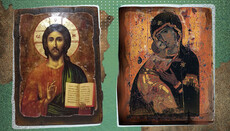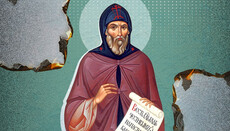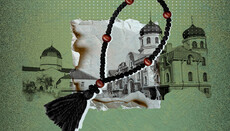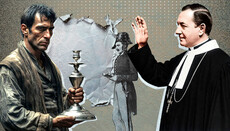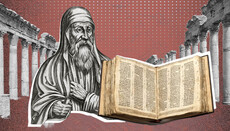Blind, less than a metre in height, paralytic – she healed the sick
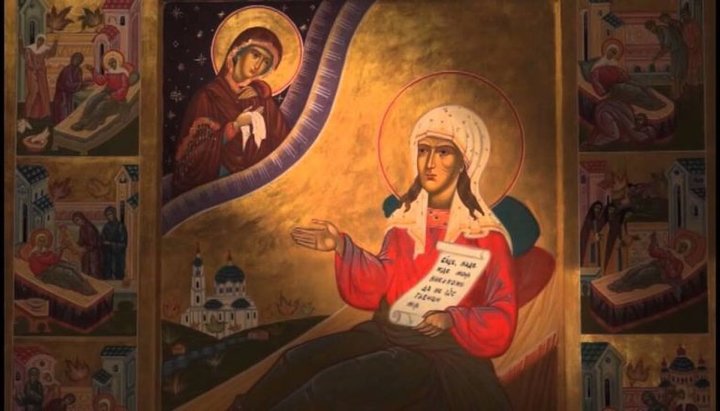
In continuation of the series of publications about the saints of our day, we offer the reader material dedicated to the Blessed Matrona Anemniasevskaya (1864-1936).
If we didn’t know that things do not just happen in life, we would say that the biography of Blessed Matrona Anemniasevskaya was accidentally discovered somewhere in the archives of the special services. But we are sure that it was God's will for the name of this holy ascetic to become known to many people.
From the point of view of basic secular logic, Matrona lived a deeply miserable life. She was born into the family of a beggar alcoholic with many children in 1864. In addition to her, the family had seven more children. For some reason, her parents disliked her from childhood and constantly offended her. At the age of seven, Matrona fell ill with smallpox and became completely blind from the complications of her illness. Nevertheless, she was forced to nurse the children and work around the house.
It happened once that Matrona accidentally dropped one of her sisters. Her mother beat her for this so heavily that she was paralyzed. During the beating Matrona saw the Mother of God several times. When all this happened, the sufferer was only ten years old. Since then, she could no longer get out of bed and completely stopped growing. The blessed Matrona's special martyr's cross began from her early childhood.
The only thing the parents did not dare to do was to kill their child. And so, being bed-ridden, she suffered endless bullying from them. The sick daughter became an object for her father and mother to vent on their gall and hatred for their own life.
The helpless Matrona endured everything and found consolation only in unceasing prayer. She spent another seven years of her life in such trials. At that time people still retained some remnants of faith and piety, realizing that the disadvantaged cripple is closer to God than everyone else. Everyone knew about Matrona's pious nature and her suffering life.
Once a fellow villager, who made a living by sawing wood, came into the house where Matrona lived. But was unable to work because of severe back pain. He asked Matrona to pray for him and touch his aching back. She fulfilled his request, and the back pain really stopped. After that, people began to go to Matrona's house, asking for her prayers and help. According to eyewitnesses, there were many miraculous healings that took place through her prayers. The Matrona's family began to use this situation to their advantage. Her father drank away all the donations that people brought to the unfortunate girl, while the siblings looked at Matrona exclusively as a source of their income.
It started raining one night in October, and water poured through the roof directly into Matrona's bed. Then frost began, and the blessed one was covered with ice and frozen stiff.
After the death of her parents, Matrona found lodgment with one of her nephews. But in his house she also had hard times. She constantly lay in a crib, curtained, in the corner of the house. In the summer, due to the heat, it was very difficult for her to breathe. It happened that the bed with Matrona was placed in the entrance, where she was kept until the very frost. It started raining one night in October, and water poured through the roof directly into Matrona's bed. Then frost began, and the blessed one was covered with ice and frozen stiff. There were many examples of such martyrdom in her life.
As for her looks, Matrona was less than a meter tall and very thin. She could only roll over from side to side and move her arms a little. The blessed one spoke well and often sang church hymns. In some amazing, incomprehensible way, she knew by heart almost all liturgical hymns and was good at quoting the Gospel. When people came to her for spiritual help and admonition, she read those prayers that were suitable for resolving their request.
Even more surprising was Matrona's sagacity. She knew everything about the life of those who turned to her for help: she knew their names, spoke about events from their lives, as if she saw everything with her own eyes. With her inner gaze, she saw not only what was in the past, but also what will happen in the future. She often denounced those who came to her of secret sins, forced them to go to church and repent of what the person had long forgotten. All these gifts attracted the people of God to her, who were imbued with great love and respect for Matrona.
* * *
A whirlwind of revolutionary madness swept over the country. The Komsomol members began to laugh at the relatives in whose house Matrona lived, they were accused of religious propaganda and insane obscurantism. Nevertheless, Matrona herself very often and advised everyone who turned to her for help to do so.
Matrona very often received the Holy Gifts of Christ and advised everyone who turned to her for help to do so.
No one told her about the appearance of the Renovationists and the schism they had brought along into church life. But the blessed one miraculously knew about everything that was happening in the country, engulfed in turmoil, and uncompromisingly denounced the priests who had gone to Renovationism. She categorically demanded that none of those who came to her even dare to talk to the renovationist clergy.
By that time, it was already known about numerous miraculous healings that were performed through the prayers of the Blessed Matrona. But the more veneration she enjoyed from people, the more hatred the Soviet government felt towards her.
* * *
After the Great Lent in 1933, Matrona’s behavior noticeably changed. If earlier she approached everyone very simply, consoled everyone, delved into the grief of each person, talked for a long time and willingly, discussing all sorts of everyday affairs, now the blessed one seemed to have completely ceased to be interested in earthly life. She began to speak rarely and reluctantly about everyday affairs, only in exceptional cases. Instead, she was ready to talk for a long time about spiritual life, especially about the future life. Very willingly, with love, she received people who would come to her with questions of spiritual nature.
“Now I am not Matrona, but Mardaria,” said the saint to one of her admirers. In some way, invisible to the outside eye, in the spiritual world, she received tonsure from the Sarov elders, as the mother herself later admitted. Matrona had a special spiritual connection with the Diveyevo and Sarov monasteries.
“Now I am not Matrona, but Mardaria,” said the saint to one of her admirers.
In 1935, in the village of Belkovo, where Matrona lived, a criminal case was opened against the clergy. Blessed Matrona was also involved in this matter. In the spirit of the times, a meeting was held on the collective farm, at which a decision was made to “remove” Matrona as a “harmful church element”. Of the three hundred villagers, only twenty-four activists signed this document. In the resolution, without any quotation marks or irony, it was said: “This citizen is a harmful element in the village; her holiness has a strong impact on the common people. In view of the above, the course of collectivization is delayed."
The chairman of the collective farm with the activists arrived by car in the afternoon, in full view, to the house of Matrona. It was evident that he entered her dwelling in awe. Nevertheless, overcoming fear, he lifted Matrona from her bed and began to carry her out of the house. “Oh, how light she is,” the chairman was surprised, raising the saint. After this incident, all his children stopped growing.
The collective farm chairman himself soon died agonizing death of a serious illness. It was a very hot summera and the whole village heard terrible cries of pain from the open windows of the collective farm chairman. People crossed themselves and said, "This is your punishment for offending our Matrionushka."
The blessed one was placed in the Butyrka prison. But she did not stay there for long, as she became an object of veneration for almost all prisoners. Many of them turned to faith and began to pray. The communists were afraid to kill her and had no reason to send her to the camp.
There is evidence from the investigator, who was handling Matrona's case, the prayers of the Blessed Matrona healed his hopelessly sick mother. As a token of gratitude, he freed her as sick and dying and placed her in a nursing home.
The blessed one died on July 29, 1936 at the Radishchev House of Chronicles in Moscow. Apparently, she was buried here, at the Vladykino cemetery, which was located next to the House.
By the decision of the Jubilee Council of Bishops in 2000, Blessed Matrona was canonized among the new martyrs and confessors for general church veneration as an example of extraordinary patience, firmness of faith and confession.
Holy Blessed Matrona, pray to God for us!
